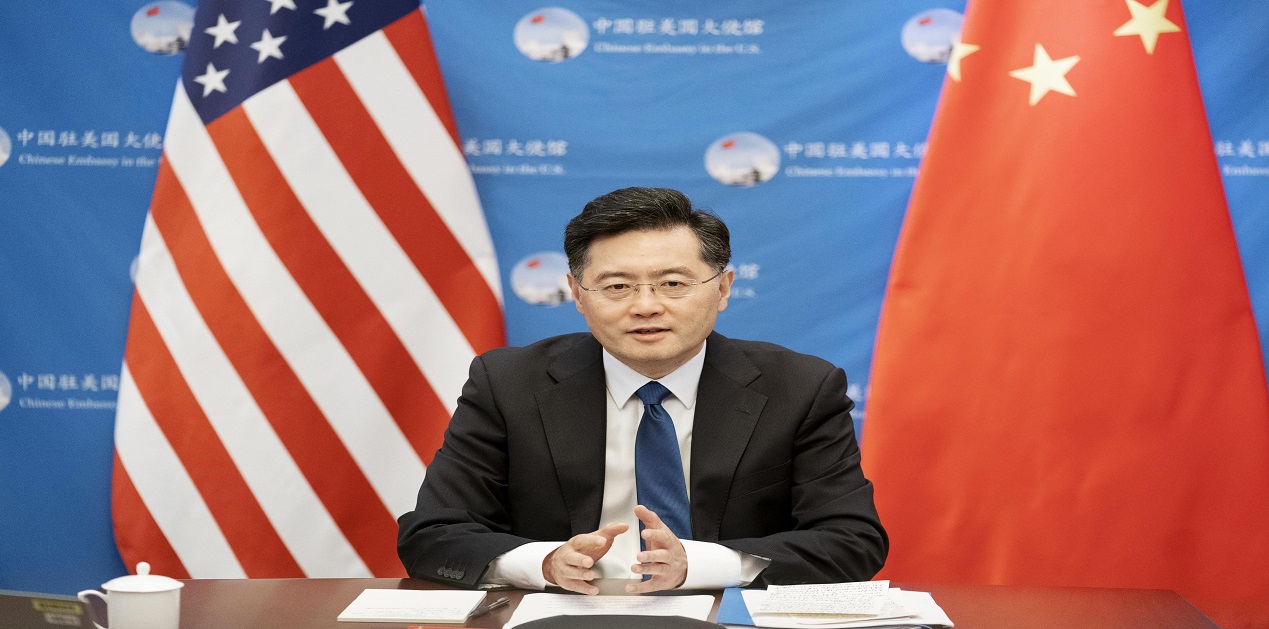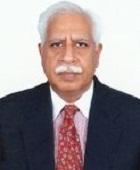The latest (May 16) issue of the Chinese Communist Party (CCP)’s leading theoretical fortnightly magazine ‘Qiu Shi’ (Seeking Truth) included a lengthy article by Chinese State Councillor and Foreign Minister Qin Gang. In it Qin Gang quite explicitly, but without naming, criticised the US and West and outlined China’s global foreign policy agenda. Qin Gang is a close associate and protégé of Chinese President Xi Jinping and for years was in charge of managing Xi’s foreign policy schedule. Just 57 years old, Qin Gang’s rise has been rapid and he is well positioned to make it to the Politburo at the next Party Congress in 2027.
The over 4000-word article authored by Qin Gang, which contained at least five mentions of Xi, was titled 'Provide new opportunities for the world with Chinese-style modernization'. Qin Gang has attempted to portray China as a benign economic power that has made major contributions to global progress. The article touched on topics of current interest and specially folded them within the policy initiatives associated with Xi. These include Chinese-style modernisation, Global Development Initiative, Global Security Initiative and the Global Civilisation Initiative. China’s official media propagates these global initiatives almost daily with articles by Chinese researchers exploring and explaining different aspects of a specific initiative. Qin Gang additionally folded ‘common prosperity’ and the Belt and Road Initiative, both also closely associated with Xi, into Chinese-style modernisation. Both these initiatives have had reduced mention in the official media over the past year. Qin Gang has credited Xi for all these initiatives by asserting that “Xi Jinping is the core of the Party Central Committee and the core of the whole party is at the helm to guide the navigation”. This suggests that they will be important items in China’s foreign policy agenda during Xi’s third term.
Qin Gang called "Chinese-style modernization”, China’s most recent and prominent initiative to which references by Chinese leaders and in the official media noticeably increased over the past year, a major long-term achievement of the Party and people which came after 100 years of perseverance and “the birth of the Communist Party of China” and “did not fall from the sky, nor did it emerge from the ground”. He clarified it was “under the leadership of the Party Central Committee with Xi Jinping at its core that the “accelerator button” has been pressed”! Describing Xi as “the chief architect and leader of Chinese-style modernisation”, Qin Gang emphasised that Chinese-style modernization is essential for “the great rejuvenation of the Chinese nation”. He attributed China’s growth from a poor country to the world’s second largest economy, largest trader in goods and manufacturer and with the largest foreign exchange reserves, to it.
Advancing China as an example for other countries, he sought to emphasise that the "Chinese-style modernization path that China has found through independent practice is deeply rooted in the excellent traditional Chineseculture.... showing a new picture different from the Western modernization model and creating a new form of human civilization". Stressing it was not a case of imposing another model of development; he also cautioned that "blindly copying foreign models will not only lead to the opposite direction but may even lead to disastrous consequences".
He sought to reinforce this argument by recalling that China had “always envisioned a world of great harmony”. Asserting that food and clothing alone are not adequate, he asserted that in proposing the ‘Global Civilisation Initiative’, Xi had advocated the importance of ‘civilisation inheritance’ and respect for the diversity of world civilisations. Modernisation, he pointed out, does not mean the decline of civilisations, but would, in fact, promote the rebirth of traditional culture. Since the past few weeks the Chinese Communist Party (CCP)’s official newspaper ‘People’s Daily’ has placed it in a prominent position on the front page and refers to it as “Xivilisation”!
Presenting the ‘Global Development Initiative’, the Chinese Foreign Minister stressed that China’s development is not to seek hegemony and that in China’s vocabulary “there is no such thing as a strong country must seek hegemony”. At the same time, he said “the strength of Chinese diplomacy is not to be afraid of hegemony”. He called the Initiative a people-centred philosophy that had lifted more than 400 million people into the middle-income group. He claimed that "Every day, 320 million US dollars of Chinese direct investment goes to the world, and more than 3,000 foreign-funded enterprises settle in China every month. In the past 10 years, China's contribution to global growth exceeded the sum of the contributions of the G7 countries". He said this Initiative had been widely welcomed across the world. Alluding to efforts by the US and West to build “trusted” global supply chains to which China would not be central, he countered by saying that most people opposed “decoupling” with China and, instead, looked forward to partnering with it.
Wrapping ‘common prosperity’ and the ‘Belt and Road Initiative’ within the Global Development Initiative, Qin Gang said "The common prosperity of people all overthe world requires the common development of all countries". He pointed to "the joint construction of the Belt and Road initiative and the global development initiative as public goods provided by China to the international community". He said in the past 10 years since the Belt and Road Initiative was put forward, “more than 3,000 cooperative projects have been formed, which have stimulated investment of nearly one trillion US dollars, and created 420,000 jobs for countries along the route". He urged countries to "uphold the correct direction of globalization and oppose the construction of walls and barriers, decoupling, unilateral sanctions, and extreme pressure.... make every effort to maintain the stability and smooth operation of industrial and supply chains". Addressing the growing concerns around the world and especially of nations in China’s debt, he assured that China will do its "best to help developing countries alleviate their debtburdens. This will enable international finance to break free from the nightmare of speculation, sanctions, and pressure, and return to serving the real economy and promoting modernization".
Discussing the ‘Global Security Initiative’, Qin Gang said it had been proposed by General Secretary Xi Jinping and pointed out the correct direction of common security and universal security. Stating that “Enemies should be resolved rather than knotted”, he cited China’s intervention that prompted Saudi Arabia and Iran to resume diplomatic relations as an example. He referred also to the protracted crisis in Ukraine and China’s efforts to promote talks for "decompressing" the crisis and "cooling down" the situation. He claimed “facts have proved that China's modernization is the growth of the force for peace and the growth of the force for justice".
Reflecting the importance of Taiwan’s reunification with Mainland China to the CCP leadership, Qin Gang dealt with it in a separate sub-section captioned “more resolutely safeguard the international order”. Qin Gang asserted that the UN charter is the cornerstone of the stability of the international order, but reiterated that China will “unswervingly promote the establishment of a new type of international relations”. On Taiwan, he said that "Taiwan's return toChina was an integral part of the post-World War II international order”. He stated that “The Taiwan independence" separatist forces and a small number of countries attempting to use "Taiwan independence" to undermine international rules and the stability of the Taiwan Strait are, in essence, trying to set aside the one-China principle, subvert the post-war order, and trample on China's sovereignty”. Qin Gang declared “More than 1.4 billion Chinese people will never agree! Once China's land is recovered, it will never be lost again”. Introducing a degree of apparent ambiguity, he announced “Once the international order has been established after the war, it will never be allowed to be subverted. Safeguarding national sovereignty and territorial integrity is justified. We will never be ambiguous about whoever wants to make a fuss about the one-China principle; whoever wants to make moves on China's sovereignty and security, we will never back down". Qin Gang does not clarify whether he refers to the existing international order or the one to be established in the future after Taiwan’s reunification with Mainland China.
Equally direct was Qin Gang’s assertion that “modernisation is the inalienable right of every country” and countries should not set up roadblocks and obstruct others from modernising. He announced that “China does not engage in competition between major powers” and opposes creating ideological confrontation, engaging in a “new cold war” and interfering in other countries’ internal affairs.
Qin Gang’s article clearly seeks to present China to the world as an alternative to the US and West. At the same time the article is critical of the US and West and their efforts to contain China. It affirms that China will not back down from contestation with the US and West, while also suggesting that Beijing wants to avoid confrontation. Qin Gang’s article confirms the importance of all the initiatives mentioned indicating it is probable that they will be pushed during Xi’s current term. It can be expected that they will increasingly figure in statements by Chinese diplomats and be advocated in official and media interactions. The inclusion of the Taiwan issue in the article is deliberate in the backdrop of rising US-China tension. The paragraph emphasises Beijing’s resolve. It is an implicit warning to the US and underscores the importance of Taiwan for Xi and the Chinese leadership while hinting at some urgency.
Image Source: https://www.scmp.com/news/china/diplomacy/article/3205146/china-names-ambassador-us-qin-gang-new-foreign-minister











Post new comment